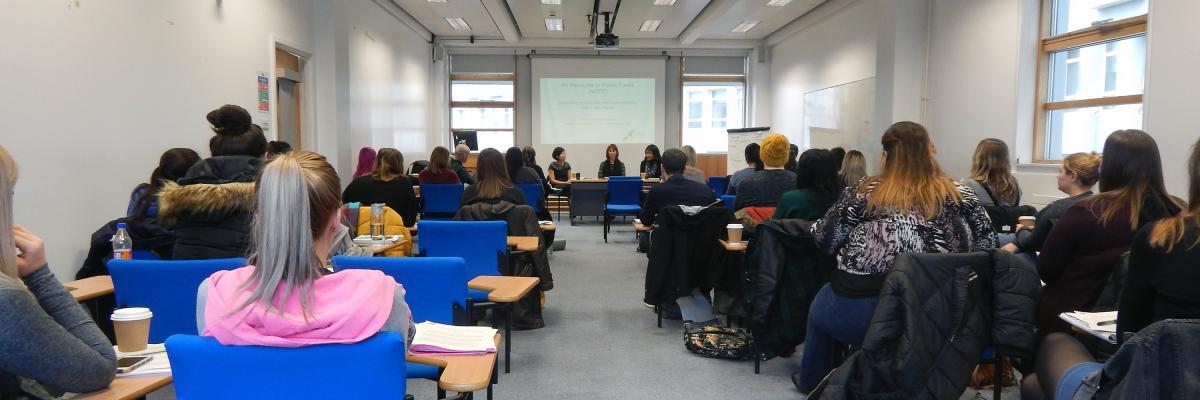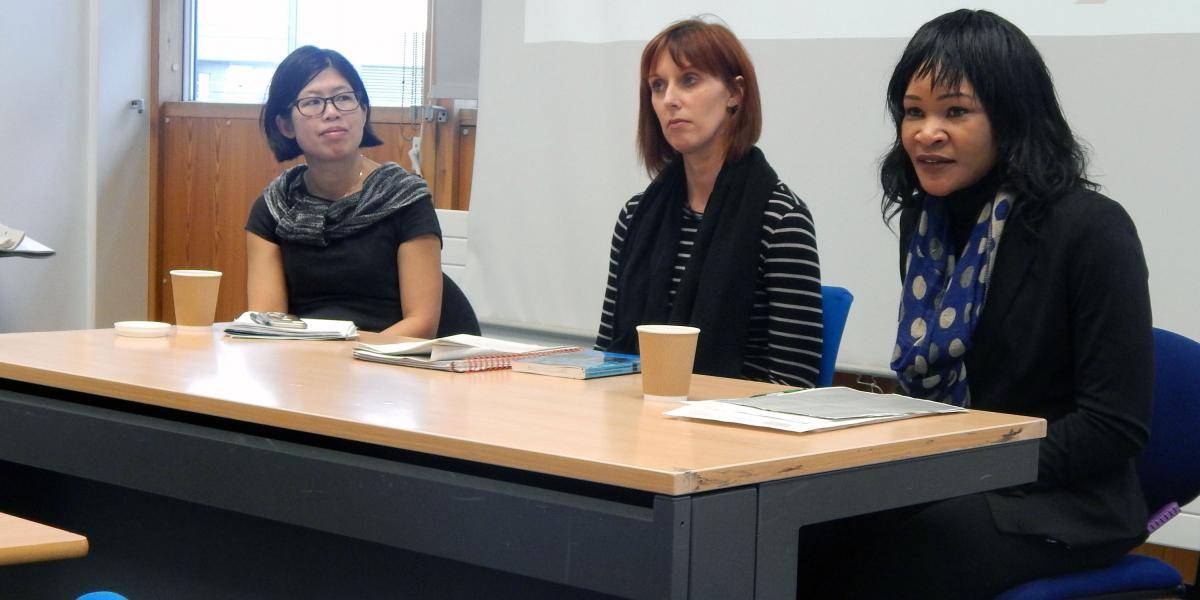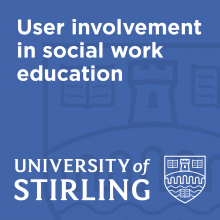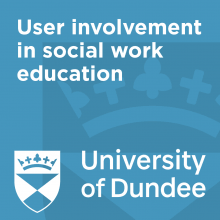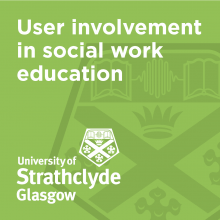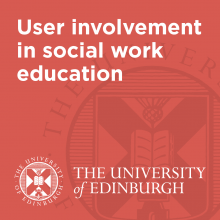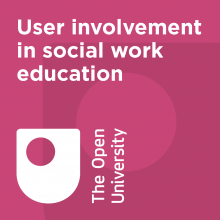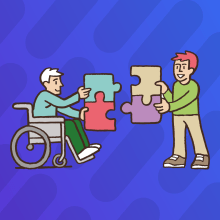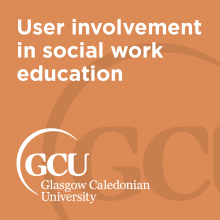This is one of seven stories, showcasing what service user and carer (SUAC) involvement in social work education looks like, what makes it work and what benefits it brings. It has a significant role to play in shaping the next generation of practitioners.
SUAC involvement in social work education has been mandatory for 15 years now, so there is a lot of learning to share with others who can learn from this - transferrable to educators and practitioners working across public services, and relevant to policy-makers committed to mainstreaming person-centred – or person-led – approaches based on real partnership working between those who use and those who deliver services.
On 20 November 2017, social work students at Glasgow Caledonian University took part in a session that formed part of their Working with Law and Ethics module. It was entitled, No Recourse to Public Funds (NRPF): Supporting Individuals and Understanding their Rights. Its primary focus was on children and families.
The morning provided input from a human rights lawyer, Jen Ang from JustRight Scotland, and Natalia Farmer, a PhD student completing ethnographic research on this topic. Both brought case study material into the session. Critically, however, the session also contained Olivia's story. Olivia shared her first-hand experiences of being in the immigration system and its intersection with 'NRPF' and social work, as she struggled to receive the support that she and her child were entitled to.
Olivia's story identifies critical points where social worker's lack of awareness of immigration law and its intersection with the Children (Scotland) Act 1995 caused huge anxiety and delays in her receiving support. It also reveals how she struggled to stay one step ahead of homelessness and destitution, which others like her, have not.
In the video you will hear from those participating in the session – a social work lecturer, researcher, a human rights lawyer and several students. They speak to how the input of service users or 'experts by experience' brings the law to life and why sessions like this matter to the social workers of tomorrow.
Some definitions and context
This is a highly complex and emerging area, and as such, we felt it necessary to provide some definitions and information as a backdrop to these narratives. We also issue the caveat that this story is of its time, and future conditions may change, nor are the examples used, exhaustive.
No Recourse to Public Funds (NRPFs)?
A person will have NRPF if they are 'subject to immigration control.' (Section 115, Immigration and Asylum Act 1999).
This means that anyone with NRPF status cannot access mainstream welfare benefits, or housing or homelessness assistance from their local authority. These are defined as 'public funds.'
The Immigration and Asylum Act 1999 effectively removed this type of state support from anyone claiming asylum and placed people with the Home Office. Asylum seekers are instead accommodated and finally supported under a separate parallel system administered by the Home Office.
Currently (June 2018) the Home Office provides 'asylum support' of £37.75 a week per person, significantly below the minimum support available under mainstream working benefits. There is only a minimal increase of £3 per week for pregnant mothers or children aged 1 to 3, or £5 per week for babies under 1 year old. The level of financial provision has previously been legally challenged as unlawfully low, particularly for families with children.
The act also led to the setting up of detention centres, such as Dungavel in 2001, and the awarding of Home Office contracts to private contractors to provide no choice of accommodation to people.
But what are 'public funds'?
There is huge confusion about what is or isn't a 'public fund.' Many wrongly understand this as any money from the public purse, including some in local authority, children and families teams.
However, 'public fund' is a term that is narrowly defined in immigration legislation. Many forms of support provided by local authorities through social services are NOT a public fund. Support under the Children (Scotland) Act 1995 is NOT a public fund. Neither is legal aid a public fund, nor Student Award Agency Scotland (SAAS) funding, for example.
However, even specialist lawyers need to check what is/isn't a public fund. A comprehensive list can be found on the Home Office website. If a source of financial support if NOT on the list, then it is NOT a public fund - meaning it could be used to support a vulnerable migrant family, or individual subject to NRPF.
Important legislation for social work
Children (Scotland) Act, 1995
This outlines duties to promote the safety and wellbeing of children in need, including the duty to provide accommodation (section 25) and financial support.
The Act is underpinned by the UN Convention on the Rights of the Child 1989, and applies to all children living in Scotland under 18 years of age. It is unlawful to discriminate on the basis of nationality or immigration status in upholding these duties. Its principles have been incorporated into Getting it Right for Every Child (GIRFEC), with this including taking the specific needs and preferences of children into account.
Significantly, section 22 of the Act places a duty on local authorities, in so far as it is consistent with its primary duty, to promote the upbringing of children by their families, providing appropriate services including assistance in cash or in kind to achieve this. Furthermore, there is a duty on the local authority 'to a child looked after by them' (section 17), to promote personal relations and regular contact between the child and any parent with parental responsibilities (as well as provide aftercare, section 29). The Act also makes provision for children affected by disability (section 23) – their own or other family members – requiring social services to provide support which, as much as possible, mitigates the effect of disability on the development of the child. Many individuals and families who have fled persecution or war also suffer from some form of physical or mental disability, making regard to this provision particularly important when working with this client group.
Section 22 empowers the local authority to provide services, not just to the child, but also to their family, if in alignment with promoting their safety, wellbeing and rights to a family life. This is not always understood, with some local authorities erroneously offering to house only the child, but not the parent/s, or older siblings.
Interpretation of social worker's duties as it sits alongside immigration law, reveals uncertainty and inconsistency in practice. Olivia's story is effective at revealing this.
Social Work (Scotland) Act 1968
Local councils have a duty under section 12 of the Social Work (Scotland) Act 1968 to promote social welfare and assess an individual's community care needs/ provide a human rights assessment. This applies to any vulnerable individual resident in Scotland, and is not contingent on them having children.
Like section 22 of the Children (Scotland) Act 1995, local authorities are empowered to provide whatever support and services are needed, in cash or kind, taking peoples' preferences into account, if necessary to prevent a breach of human rights. The question of what constitutes 'vulnerability' and 'need' is of course open to interpretation. Austerity and financial pressures on local authorities doesn't help.
For further details and UNISON/SASW guidance on applying the law
Understanding immigration status
Being subject to immigration control is extremely complex, and this alone is important to understand. A person's immigration status can change as they move through the system, or changes are made to the law. Since 1999, at the time of writing (June 2018) there have been eight immigration acts, and seven prior to this. The UK government is currently working on a new Immigration Bill.
Importantly, the immigration status or category that someone is given impacts on what support they are entitled to. For example, someone with 'refugee status' who is formally recognised as having fled their home country to escape persecution, can work and claim benefits. They also have the right to remain for five years - albeit this normally leads to what is called 'indefinite leave to remain' or what some call, permanent residence.
However, an asylum seeker- someone in the process of applying for refugee status – is not free to work and cannot claim benefits. This is also true of a 'refused asylum seeker' or a 'visa overstayer' – commonly someone who has come to work or study for a time-limited period who has out-stayed or 'breached' their visa conditions, eg a student who doesn't attend classes.[1]
Those with 'limited leave to remain on human rights grounds' (normally for 30 months) can work, but cannot claim benefits (except under the destitution exception). If this has left you a little confused, you are not alone.
It is, also helpful to remember that significant numbers of asylum seekers initially refused refugee status, are successful on appeal, albeit data on this and its interpretation, varies considerably. For example, the Migration Observatory, University of Oxford (2017) reports that 'In 2016, 68% of initial asylum applications were refused but 42% of appeals against initial refusals were successful.[2] In contrast, a House of Commons Briefing Paper (2018) reports: 'In the period from 2004 to 2016, around three-quarters of applicants refused asylum at initial decision lodged an appeal, but only around a quarter of those appeals was allowed.' [3] Whatever figures we believe, 'refused refugee status' 'doesn't necessarily mean' as Jen, the lawyer says 'that you can be considered to have been lying - rather that there are barriers in the system, and often poor or no legal advice.'
Other complexities
Under international law, it is not unlawful to set a limit on the total number of refugees the UK must take. This is not the same for migrants choosing to come here for other reasons – eg educational or employment opportunities, or simply the desire to travel. The UK government can set its own criteria for these to manage numbers (with the exception of EEA nationals – albeit their rights to claim benefits have been eroded over the years, and BREXIT will change things further.)
Breach of status - consequences for dependants
There can be complications for migrant families in the UK with limited leave to remain. Imagine a family comes to the UK so that the father can pursue higher education, and his wife works to support the family. If the father, for example, stops attending his classes, not only has he breached the terms of his leave- becoming unlawfully resident - but the same applies to his spouse and children. Their status is dependent on his, so they all become unlawfully resident, and lose the right to work. Typically, this form of limited leave to remain is also subject to an NRPF condition.
Domestic violence
However, if the wife and children flee due to domestic violence, and the father is still studying, his status isn't breached, but theirs is. The mother and children become unlawfully resident, the mother can't work and also is subject to the NRPF condition. If, on the other hand, there's domestic violence in the family and the mother doesn't leave, she risks having her children taken into care. If the children are taken into care, then they become unlawfully resident, because they gave been separated from the primary leaveholder. Some may grow up in the care system, and may face being forcibly removed when they turn 18, despite the fact that they were removed from their families from their own protection.
Good and early legal advice is needed in these scenarios, with young people required to make an immigration application in good time in the second scenario; and in the first, for vulnerable families to be assisted to apply for the NRPF status to be lifted.
Social workers and other professionals supporting these groups, again, need to be able to signpost early and effectively to legal help.
Disability, vulnerability or other barrier to work
If someone has been awarded 'limited leave to remain' this might be because they came to the UK to join their family, who are here legally. Limited leave to remain is also awarded to uphold the right to family life (Article 8, EHRC). For example, where a child has lived in the UK for seven or more years, and an adult is responsible for the care of this child, or exercising rights of access or custody of the child, the adult may be granted limited leave to remain on this basis.
Importantly, the parent with 'limited leave to remain' is free to work, but has NRPF status and can't claim housing or welfare benefits. This can be problematic if the parent is unable to work - either because of a disability or other vulnerability, or perhaps because they have a baby to look after and no support networks.
Again, it is possible to apply for the NRPF condition to be lifted in these circumstances, and effective signposting to early legal advice is key. People in all these scenarios, need to know and feel they are able to approach social work for help - or do so through other trusted agencies - to receive the support they are entitled to.
[1] Visa overstayer- not allowed to work or claim benefits, irrespective of whether they have an outstanding human rights application in, or not.
[2] Blinder S (2017) Briefing: Migration to the UK: Asylum. The Migration Observatory, University of Oxford
[3] Hawkins 0 (2018) Briefing paper: Asylum Statistics, House of Commons Library, January 2018
